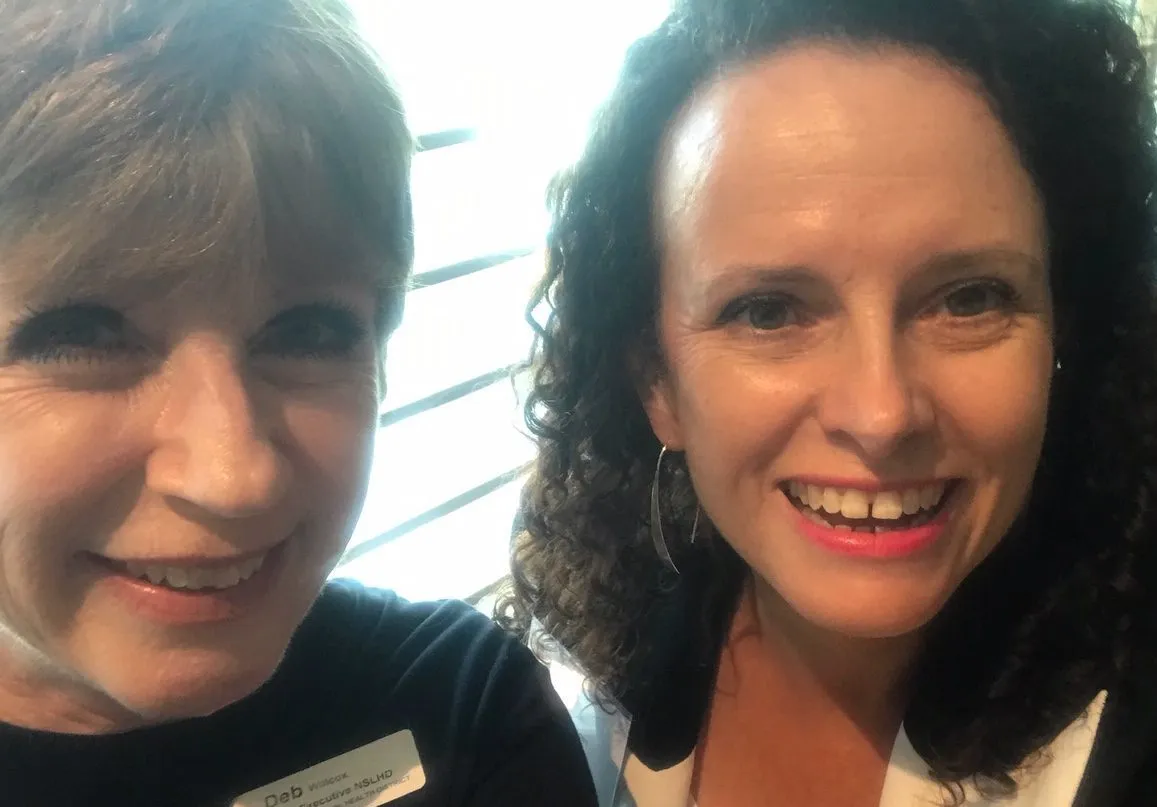
Read time: 5 Minutes
Date: 11/2019
I recently had the chance to catch up with Deborah Willcox, Chief Executive of Northern Sydney Local Health District while attending the NSW Health Board Members’ conference.
Deb was named as one of the Top 50 Public Sector Women in NSW last year, in recognition of an impressive career across government and non-government sectors and spanning clinical, corporate services, government departments, senior government adviser roles and the research environment.
So who better to ask to share some insights into how to take a project that’s proving successful in one small area, and scale it up across districts or even more widely?
-Mary Haines
Top Tips: Deborah Willcox on how to scale up good ideas
Mary Haines: So how does scaling-up happen?
Deb explains that a vital mechanism to enable scaling up is to have a dedicated governance structure and strong leadership to share information about initiatives that are proving beneficial on a small scale, and might work more broadly across the system.
For example, she says the NSW Health’s Secretary’s Senior Executive Forum comes together each month, with one agenda item to discuss initiatives that are resulting in positive patient outcomes or good learnings and that perhaps can be implemented more widely.
“I think that collegiality and collective sharing of information across the system works really well.”
Mary Haines: And what sort of ideas scale-up most successfully?
“Usually the things that work well are things where you say: ‘why didn’t we think of this before?’ They are usually the simplest ideas.”
She cites the example of the now globally successful #TheatreCapChallenge, which has seen operating theatre staff at Royal North Shore Hospital and many other hospitals across Australia start writing their names and roles across the front of their operating theatre caps, to enhance patient safety.
Deb explains that it’s a key quality and safety measure for operating theatre staff work as a team, but that is often hindered by the fact they are hidden behind hats, goggles and masks. Putting their name and role on their may look simple, but it can have a big impact.
“It’s great for teamwork and knowing who everybody is on a human level but also a great patient safety and quality initiative and that’s why it has been scaled up so successfully,” she says.
The NSW Health Minister, Brad Hazzard also highlighted this as an excellent example of innovation and scaling up in his remarks at the conference.
“I think it never works to foist things on people. We have to have regard and respect for local identity, community values and needs of a particular place at a particular time.”
-Deb Willcox
Mary Haines: So what are the common mistakes that can jeopardise success when initiatives are scaled-up?
“I think it never works to foist things on people,” Deb says. “We have to have regard and respect for local identity, community values and needs of a particular place at a particular time.”
“We’re delivering services that are quite similar across the state, with varying complexity, but our communities and staff are different.
“If you have an idea that works well in one particular district, the bones of it may well suit other areas, but the way we implement it may need to be different to meet local needs.”
Mary Haines: How can you go about getting your effective local initiative or idea rolled out more widely?
Deb outlines a few “main ingredients”: Building the case with evidence, testing the concept with colleagues – and listening carefully to what they have to say.
“I think it’s about building the case,” she says. “In terms of making an intellectual decision about what’s a good thing to do, having some data in front of you makes a big difference. So if I have a doctor or a nurse or allied health professional who’s got a good idea for something, I would say let’s see how we can build this case.”
Developing an “inner-cabinet of colleagues” to test the idea, is also key, she says.
”Make sure you’ve heard everything that everybody’s saying and that you are not just stuck on your way of doing it. Test the idea – you need to listen to the input from your coalition of supporters or advocates for what you are trying to achieve.”
Mary Haines: Is it true the health sector is a step behind other sectors when it comes to scaling up successfully?
“I don’t subscribe to the view that we don’t do it well,” Deb says. “ Obviously you can do it better, but I think there is collegiality across the system…. and I do think there’s a large amount of health information that is shared.”
Cultural change, leadership and an engaged workforce will be key to the healthcare sector’s future success in identifying pockets of excellence and scaling them up, she believes. Having structures in place such as the Senior Executive Forum and the Advanced Health Research and Translation Centres (AHRTCs) can support scaling up good ideas into the future.
“I think it’s an evolution and I think it’s very much dependent on leadership within the system, to make sure we keep it as a focus. Structures will help but the people and desire to learn and get better is what we want, and that’s about our workforce and our attitudes.”
November 2019.
Interview by Mary Haines, Founder and Director of Mary Haines Consulting (MHC), a boutique consultancy specialising in strategy, implementation, research and evaluation. MHC developed the five minutes interview series as a platform for leading professionals to share their know how.
You are welcome to republish this article. Please include the following attribution:
This article was first published by Mary Haines Consulting Pty Ltd: www.maryhainesconsulting.com.au.



© 2015-2023 MH Consulting Group (MHC) | Disclaimer | Privacy
